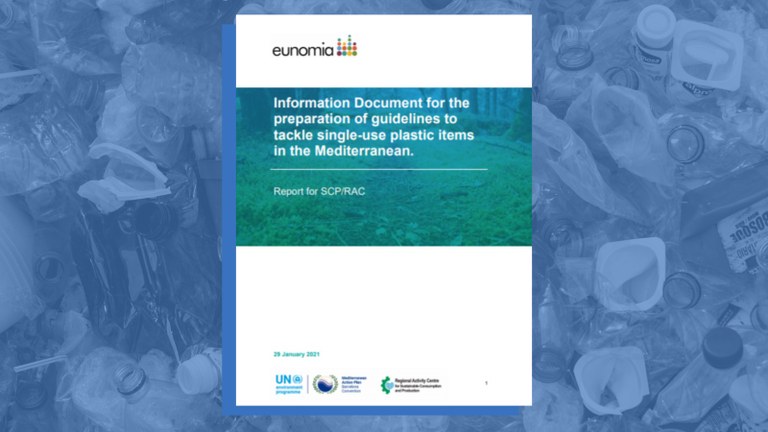NEW RESEARCH OUTLINES MOST APPROPRIATE POLICY MEASURES FOR REDUCING SINGLE USE PLASTIC LITTER IN THE MEDITERRANEAN
The marine plastic problem in the Mediterranean is extensive, with 229,000 tonnes of plastic litter estimated to leak into the sea every year. Despite only covering 1% of the world’s ocean, the Mediterranean is estimated to hold up to 55% of all floating ocean plastic particles and concentrates 7% of all global microplastics.
The Regional Activity Centre for Sustainable Consumption and Production (SCP/RAC) in collaboration with Eunomia Research & Consulting, published an information document on the production, consumption, end of life management and impacts associated with beverage bottles, including caps and lids; food containers (bowls, clamshells, trays); straws and cigarette filters in Egypt, Morocco, Montenegro and Greece.
The information document will support the development of regional guidelines to tackle single-use plastic pollution in the Mediterranean. The guidelines are being developed by SCP/RAC as requested by the Contracting Parties to the Barcelona Convention during the COP21. Once finalized, the guidelines will be put forward for adoption at the Barcelona Convention COP22 meeting in December 2021.
Introducing Deposit return systems (DRS) and extended producer responsibility (EPR) schemes are the most successful policy measures at reducing single-use plastic litter while having positive economic and employment impacts in the Mediterranean region, according to this new research carried by Eunomia and commissioned by SCP/RAC.
The information document reports that introducing a DRS was the most successful policy measure in reducing marine plastic litter, showing it would prevent a combined 16,000 tonnes of marine litter by 2030, as well as saving 620,000 tonnes of CO2 equivalent. This figure is equivalent to emissions from approximately 240,000 citizens (total population of 4 studied countries countries is circa. 150 million).
Meanwhile, an EPR system would prevent 10,000 tonnes of marine litter, and was shown to be the most impactful in terms of reducing the item count of single-use plastic items, reducing the number of items covered by the system ending up as marine litter by 55%.
The combination of DRS and EPR would imply a reduction in litter equivalent to nearly 1,700 truck-loads of plastic waste per year in the Mediterranean sea.
Both a DRS and EPR system would also have a significant positive economic impact, with a DRS creating 11,500 jobs and saving €15 million in waste management costs, and both measures saving millions of euros in external environmental costs - €2.2 billion for a DRS and €1.4 billion for an EPR.
A number of recommendations for the regional policy guidelines are included in the document:
- improve waste collection and separation, particularly along coastal areas and waterways;
- use bans on single-use plastic items and levies on other single-use items side by side to maximise their effect;
- implement a DRS for beverage containers;
- implement nationwide drinking water and refill systems;
- improve data availability and data collection; and
- maximise the sorting of plastics from residual waste prior to landfill or energy recovery.

